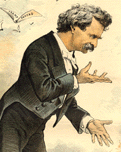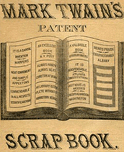| [This toast, delivered 11 January 1868 to a banquet room full of journalists, was one of MT's first great public successes in the east. On the left below is the text, as published in the paper the next day and widely reprinted across the country in the following weeks. On the right, part of the story of MT's own mixed feelings about the address.] |
|
TEXT (OR TWAIN TEXT ONLY) The Washington Star 13 January 1868 Mark Twain's Eulogy of the Fair Sex. The Washington Correspondents' Club held its anniversary on Saturday night. Mr. Clemens, better known as Mark Twain, responded to the toast "Woman, the pride of the professions and the jewel of ours." He said: MR. PRESIDENT: I do not know why I should have been singled out to receive the greatest distinction of the evening -- for so the office of replying to the toast to woman has been regarded in every age. [Applause.] I do not know why I have received this distinction, unless it be that I am a trifle less homely than the other members of the Club. But, be this as I may, Mr. President, I am proud of the position, and you could not have chosen anyone who would have accepted it more gladly, or labored with a heartier good will to do the subject justice, than I. Because, sir, I love the sex. [Laughter.] I love all the women, sir, irrespective of age or color. [Laughter.] Human intelligence cannot estimate what we owe to woman, sir. She sews our buttons [laughter], she mends our clothes [laughter], she ropes us in at the church fairs -- she confides in us; she tells us whatever she can find out about the little private affairs of the neighbors -- she gives us good advice, and plenty of it -- she gives us a piece of her mind, sometimes -- and sometimes all of it -- she soothes our aching brows -- she bears our children (*). In all the relations of life, sir, it is but just, and a graceful tribute to woman to say of her that she is a brick. [Great laughter.] Wheresoever you place woman, sir -- in whatever position or estate -- she is an ornament to that place she occupies, and a treasure to the world. [Here Mr. Twain paused, looked inquiringly at his hearers and remarked that the applause should come in at this point. It came in. Mr. Twain resumed his eulogy.] Look at the noble names of history! Look at Cleopatra! look at Desdemona! look at Florence Nightengale! look at Joan of Arc! look at Lucretia Borgia! [Disapprobriation expressed. "Well," said Mr. Twain, scratching his head doubtfully, "suppose we let Lucretia slide."] Look at Joyce Heth! look at Mother Eve! (*) I repeat, sir, look at the illustrious names of history! Look at the Widow Machree! Look at Lucy Stone! Look at Elizabeth Cady Stanton! Look at George Francis Train! [Great laughter.] And, sir, I say with bowed head and deepest veneration, look at the mother of Washington! She raised a boy that could not lie -- could not lie. [Applause.] But he never had any chance. It might have been different with him if he had belonged to a newspaper correspondent's club. [Laughter, groans, hisses, cries of "put him out." Mark looked around placidly upon his excited audience and resumed.] I repeat, sir, that in whatever position you place a woman she is an ornament to society and a treasure to the world. As a sweetheart she has few equals and no superiors -- [laughter;] -- as a cousin she is convenient; as a wealthy grandmother with an incurable distemper, she is precious; as a wet nurse she has no equal among men! [Laughter.] What, sir, would the people of this earth be, without woman? They would be scarce, sir. Then let us cherish her -- let us protect her -- let us give her our support, our encouragement, our sympathies -- ourselves, if we get the chance. [Laughter.] But, jesting aside, Mr. President, woman is lovable, gracious, kind of heart, beautiful -- worthy of all respect, of all esteem, of all deference. Not any here will refuse to drink her health right cordially, for each and every one of us has personally known, and loved, and honored, the very best one of them all -- his own mother! [Applause.] |
BEHIND THE SCENES
The Star's transcript is a good one, but the paper left out two of MT's most risque jokes -- their places are marked in the text at left with asterisks, and can be accessed by clicking on the (*). MT was initially delighted with both his live performance and the subsequent publicity: he sent copies of this article to his "own mother!" and to the Alta California. Soon, however, he became anxious about how well the performance would play with the genteel audiences he was trying to adapt his persona to. That audience was, at this point, epitomized by Mrs. Mary Fairbanks, the slightly older wife of a Cleveland publisher whom MT met on the Quaker City tour and was soon calling "Mother." To her he wrote on January 24: Dear Mother -- Don't abuse me on account of that dinner-speech in reply to the toast to Woman, if you should see it floating around in the papers. -- It had slang in it, but they had no business to report it so verbatimly. . . . I am not going to make any more slang speeches in public. You will forgive me, now, won't you? Apparently Mrs. Fairbanks did see the speech, and did abuse him for it. On January 30 he wrote: P.S. -- I confess, humbly, that I deserve all you have said, & promise that I will rigidly eschew slang & vulgarity in future, even in foolish dinner speeches, when on my guard. Although the record of the performance seems lost, within a month MT apparently addressed himself again "To Woman." This time, he felt, his speech was one "Mother" Fairbanks would be pleased with, as he told her in a letter dated February 20: I acknowledge -- I acknowledge -- that I can be most laceratingly "funny without being vulgar." In proof whereof I responded again to the regular toast to Woman at a grand banquet night before last, & was frigidly proper in language & sentiment. . . . Now haven't I vindicated myself & shed honor upon my teacher & done credit to her teachings? With head uncovered, & in attitude suppliant but yet expressive of conscious merit, I stand before you in spirit & wait my earned "Well done," & augmented emolument of bread & butter -- to the end that I may go & slide on the cellar door & be happy. MT knew that people laugh when they are uncomfortable, so he was always working right at the line between teasing or provoking his audience and shocking or offending them. Except for a few very private performances ( 1602 and "Some Remarks on the Science of Onanism") MT made little use of sexual humor -- less, probably, than even his repressive culture would have allowed him, and amazingly little by the standards of modern comedy. It does not seem that many people besides Mrs. Fairbanks would have objected to this 1868 toast, at least as reprinted in the Star . Apparently his own mother, from a less refined realm than Mary Fairbanks, enjoyed it. On the other hand, MT's speech at the Whittier Birthday Dinner set off a number of critics. It treated with slang and irreverence another of Victorian America's sacred icons -- not woman, but the gentleman man-of-letters. |


